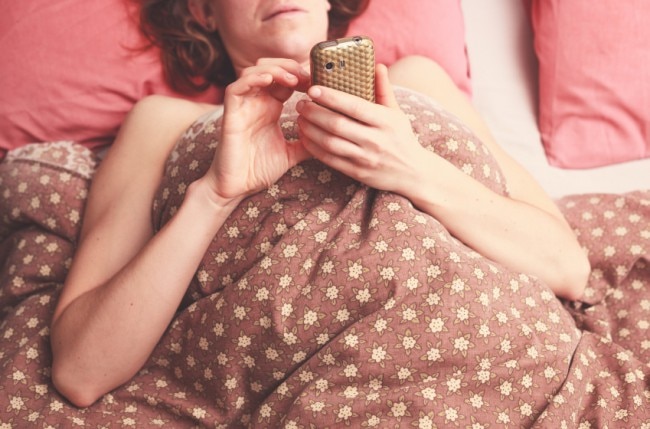The alarm clock isn’t the only technology in the bedroom these days. More Americans are introducing television, smart phones and other electronics into an area designed for rest. And many of us are using those technologies close to bedtime.
In fact, according to a 2011 poll on technology and sleep by the National Sleep Foundation, 95% of those surveyed reported using electronics within an hour before trying to fall asleep.
Mounting evidence suggests that the addition of technology in the bedroom is damaging our wellbeing in a variety of ways.
Here are three reasons to keep technology out of the bedroom:
It’s bad for sleep
If you want to increase your sleep quality, get rid of those bedroom electronics.
“You need that quiet, dark and cool bedroom to set the stage for the theater of the night, which is a good night’s sleep,” says Jim Maas, CEO of Sleep for Success, Ph.D. and former professor of psychology at Cornell University.
Your sleep cycle is largely regulated by a natural hormone called melatonin. As it gets later in the evening, our brains start producing melatonin, helping our bodies fall asleep and stay asleep, says Scott Kutscher, Professor and M.D. at Vanderbilt University in Nashville, Tennessee.
Light, on the other hand, suppresses melatonin, which reduces our body’s natural ability to fall asleep, says Kutscher.
And blue light – the kind emitted by cell phones, tablets and television – is one of the worst for preparing to drift off at night.
The cells in the back of your retina are sensitive to all light, but they are at least twice as sensitive to blue light, explains Michelle Jonelis, MD, a fellow in sleep medicine at the Stanford University. Using these technologies at night tells your body, generally, that the sun is still up, which can counteract the body’s natural ability to fall asleep, she notes.
But it’s not just the light from electronics that’s disturbing our sleep. It’s the stimulation before bed and even the small push notifications or reminders from your cell phone that may wake you up at night, notes Jonelis.
Kutscher says that technology in the bedroom can cause us to delay sleep, accumulate sleep debt and create a state of chronic sleep deprivation. Over time, we can develop negative associations with the bedroom, leading to insomnia. “The reason for this is that even though we may want to go to sleep, our brains see the bedroom and subconsciously associate it with looking at the computer or the phone rather than with sleep,” says Kutscher.
Here’s a quick tip: If you’re having trouble falling asleep, or just want to give your sleep a boost, you may want to try using essential oils before bed. Aromatherapy from oils like lavender offer calming and relaxing effects.
It can harm your general health
There are multiple ways that poor sleep, whether it’s due to electronics or something else, can negatively impact health.
Poor sleep quality, insomnia and lack of sleep are associated with decreased daytime attention, decreased concentration, as well as daytime sleepiness, says Kutscher.
“On a day to day basis, this can mean poorer performance at work, while exercising or even an increased risk of accidents, for example while driving,” he says.
It can even increase the risk of serious health problems over time, including hypertension, type 2 diabetes, obesity, cancer and Alzheimer’s disease, notes Maas. He says that a lack of sleep can make you irritable, anxious and depressed as well.
“Almost anything that has to do with health and performance is affected by sleep,” says Maas.
It can negatively affect your relationship
If you’re having relationship trouble, ditching the bedroom tech may help.
That’s especially important for young parents, who might be very busy or in the work force and have limited time to interact, notes Maas.
He says that if the only thing you’re interacting with is your computer, video game or a TV program in the bedroom, it’s affecting the way you interact with each other.
Indeed, more studies are showing that technology can have a negative impact on our relationships. Seventy percent of women in a 2014 survey published in the journal Psychology of Popular Media Culture said that smartphones were interfering with their romantic relationship. The most common “interference” was seeing a partner pick up his phone during “couple leisure time.”
“When individuals place their technology above their partner, even if unintentionally and only for a brief moment, they can sow conflict in their romantic relationship, which may then lead to negative outcomes,” says Brandon McDaniel, MS, co-author of the study and pre-doctoral fellow at Pennsylvania State University.
McDaniel says that if you catch yourself in an argument with your partner over technology, it’s time to seriously assess the role technology may play in your life and in your relationships.
Quick tips for better sleep
The path to better sleep is paved with just a little effort. For example, if you’re having trouble keeping light out of your bedroom, try an eye mask. It’s an easy, and relatively inexpensive, solution.
Kutscher offers some other tips to help reduce how technology can hurt our sleep.
- Eliminate all electronic devices from the bedroom.
- Use the bed and bedroom only for sleep and sex.
- Turn off all electronic devices 30 minutes before bed.
- Engage in relaxing activities before bedtime such as meditation, deep breathing or light yoga.
- Go to bed and wake up at the same time every day, which promotes sleep by strengthening our natural sleep rhythms.

